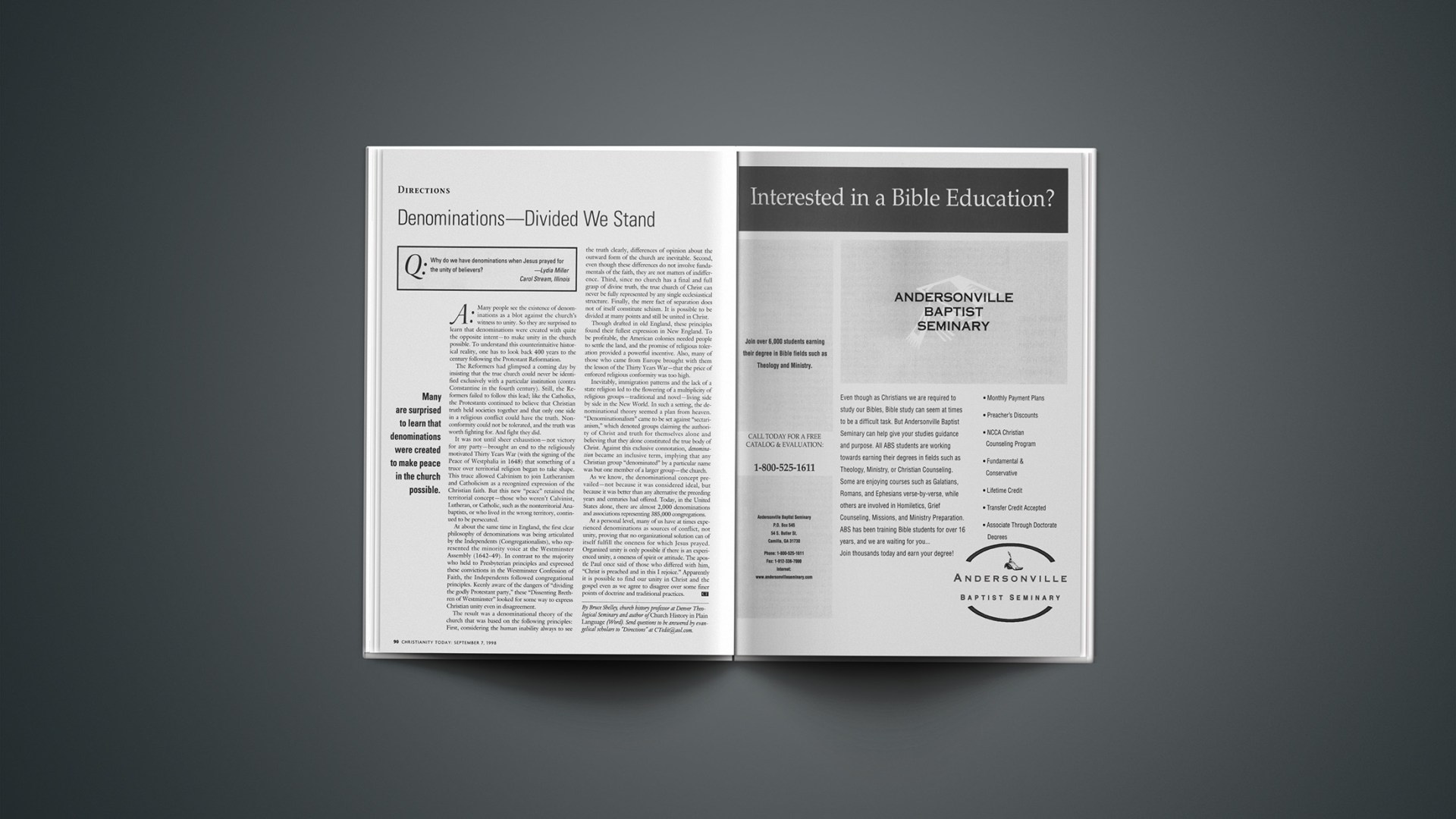Q: Why do we have denominations when Jesus prayed for the unity of believers?
—Lydia Miller Carol Stream, Illinois
A: Many people see the existence of denominations as a blot against the church's witness to unity. So they are surprised to learn that denominations were created with quite the opposite intent—to make unity in the church possible. To understand this counterintuitive historical reality, one has to look back 400 years to the century following the Protestant Reformation.
The Reformers had glimpsed a coming day by insisting that the true church could never be identified exclusively with a particular institution (contra Constantine in the fourth century). Still, the Reformers failed to follow this lead; like the Catholics, the Protestants continued to believe that Christian truth held societies together and that only one side in a religious conflict could have the truth. Nonconformity could not be tolerated, and the truth was worth fighting for. And fight they did.
It was not until sheer exhaustion—not victory for any party—brought an end to the religiously motivated Thirty Years War (with the signing of the Peace of Westphalia in 1648) that something of a truce over territorial religion began to take shape. This truce allowed Calvinism to join Lutheranism and Catholicism as a recognized expression of the Christian faith. But this new "peace" retained the territorial concept—those who weren't Calvinist, Lutheran, or Catholic, such as the nonterritorial Anabaptists, or who lived in the wrong territory, continued to be persecuted.
At about the same time in England, the first clear philosophy of denominations was being articulated by the Independents (Congregationalists), who represented the minority voice at the Westminster Assembly (1642-49). In contrast to the majority who held to Presbyterian principles and expressed these convictions in the Westminster Confession of Faith, the Independents followed congregational principles. Keenly aware of the dangers of "dividing the godly Protestant party," these "Dissenting Brethren of Westminster" looked for some way to express Christian unity even in disagreement.
The result was a denominational theory of the church that was based on the following principles: First, considering the human inability always to see the truth clearly, differences of opinion about the outward form of the church are inevitable. Second, even though these differences do not involve fundamentals of the faith, they are not matters of indifference. Third, since no church has a final and full grasp of divine truth, the true church of Christ can never be fully represented by any single ecclesiastical structure. Finally, the mere fact of separation does not of itself constitute schism. It is possible to be divided at many points and still be united in Christ.
Though drafted in old England, these principles found their fullest expression in New England. To be profitable, the American colonies needed people to settle the land, and the promise of religious toleration provided a powerful incentive. Also, many of those who came from Europe brought with them the lesson of the Thirty Years War—that the price of enforced religious conformity was too high.
Inevitably, immigration patterns and the lack of a state religion led to the flowering of a multiplicity of religious groups—traditional and novel—living side by side in the New World. In such a setting, the denominational theory seemed a plan from heaven. "Denominationalism" came to be set against "sectarianism," which denoted groups claiming the authority of Christ and truth for themselves alone and believing that they alone constituted the true body of Christ. Against this exclusive connotation, denomination became an inclusive term, implying that any Christian group "denominated" by a particular name was but one member of a larger group—the church.
As we know, the denominational concept prevailed—not because it was considered ideal, but because it was better than any alternative the preceding years and centuries had offered. Today, in the United States alone, there are almost 2,000 denominations and associations representing 385,000 congregations.
At a personal level, many of us have at times experienced denominations as sources of conflict, not unity, proving that no organizational solution can of itself fulfill the oneness for which Jesus prayed. Organized unity is only possible if there is an experienced unity, a oneness of spirit or attitude. The apostle Paul once said of those who differed with him, "Christ is preached and in this I rejoice." Apparently it is possible to find our unity in Christ and the gospel even as we agree to disagree over some finer points of doctrine and traditional practices.
By Bruce Shelley, church history professor at Denver Theological Seminary and author of Church History in Plain Language (Word). Send questions to be answered by evangelical scholars to "Directions" at cteditor@christianitytoday.com.
Copyright © 1998 Christianity Today. Click for reprint information.










